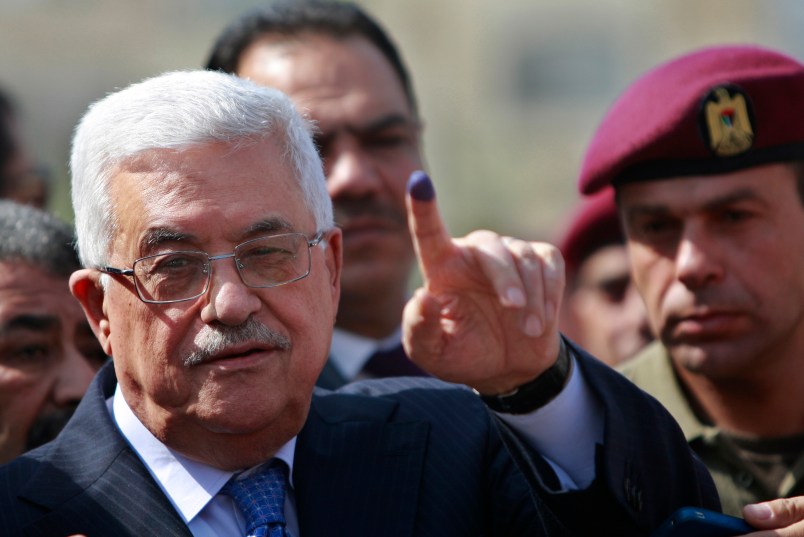The question may seem fatuous on its face. In his lifetime, Mandela had to insist he was not a saint, but a sinner. Abbas has no doubters. Mandela was the leader; Abbas, the follower; yet Mandela poured your tea, while Abbas presses a buzzer to have an aide light (and ration) his cigarettes. In his death, Mandela filled a stadium with global leaders and common people. For Abbas, a legacy of this kind seems improbable: a negotiator is not a liberator.
Moreover, the question suggests parallels between Apartheid and the Occupation that are, at best, forced. Israel, even Greater Israel, is not a privileged minority enriching itself on the labor of a racially despised majority. On the contrary, the Zionists worked from the start toward separation, to revive the Hebrew language; settlement hurt Palestinian workers as a by-product of the drive towardeconomic self-sufficiency. To this day, if most Israelis could just saw their land and global technology businesses off from Palestine, and float out toward Cyprus, they would. Their racism, if that’s the word for it, derives from generations of violence.
But all of this is beside the point, now. The real question is whether Abbas, with Mandela-like courage and grace, was prepared to both confront the Occupation and yet renounce terror, face down his own nationalist radicals, and advocate for diplomatic pathways and (mainly) non-violent resistance.
In this sense, Abbas has been deeply underestimated. Abbas—an impoverished refugee from Safed—began as a student in Damascus and then became a PLO cadre. He was romanced by Soviet ideology and blandishments; but by 1977, he was calling for meetings with Israeli peace forces. He turned to reconciliation with the Gulf states and the West. In a way, this kind of thing was harder to dare when at large, surrounded by terrorist assassins, than in prison.
Once the PA was formed, and he began negotiating in its name, Abbas was prepared to demand for Palestine only what he was prepared to give. He focused on building state institutions. Consider his 1995 deal with Yossi Beilin, signed the week before Yitzhak Rabin was killed, which could still be a model for a final status agreement.
This record of compromise continues. Last week, Palestinian negotiators directed by Abbas were said to have rejected General John Allen’s security proposals for a Palestinian state. But, broadly speaking, what would any reasonable security arrangements look like if you were concerned about past Palestinian violence? Palestine would have to be “nonmilitarized”—a strong police force, to maintain law and order, but no heavy weapons at all: no tanks, missiles, etc., or any way of acquiring them. But there would be much more.
The Palestinian border with Jordan, through which missiles and heavy armaments might be smuggled, would have to be patrolled by international forces, probably from NATO, with a strong contingent of Americans. Third, there would have to be a procedural guarantee that no foreign army would be able to enter Palestine, and its government would not be permitted to enter into any military agreement with a country that does not recognize Israel. Fourth, Israel would have the right to defend itself beyond the borders of a Palestinian state—say, against land forces massing on the eastern side of the Jordan River.
There is more still. Israel would reserve the right to hot pursuit of terrorists across the new borders. Israel would be allowed access to airspace over Palestine; overflight would be essential for training and reconnaissance. Seventh, the Israel Defense Forces would have rights to disproportionate use of telecommunications spectrum (though commercial rights would be equalized under international law). Finally, Palestine and Israel would have to cooperate in a greater Jerusalem municipality and in sharing information regarding terrorism on both sides of the border.
In fact, Abbas already agreed to all of these things, in his 2008 negotiations with Ehud Olmert. “We don’t need a Palestinian army,” Abbas told me emphatically. “We don’t want an air force or tanks or rockets.” He insisted that the whole matter had been worked out with Gen. James Jones, who eventually became Obama’s national security adviser. “The file on security was closed,” he told me. “We do not claim it was an agreement, but the file was finalized.”
Nobody outside of the negotiations can know yet just what Allen proposed. But I invite you to listen to my January, 2011 conversation with Abbas in its entirety, and judge for yourself if Israelis can expect a partner more committed to reciprocity. Indeed, the real question is not whether Abbas is the Palestinians’ Mandela, but whether Netanyahu, who skipped Mandela’s funeral, can rise to the occasion provided by John Kerry and become Israel’s de Klerk—and if not, whether the various Israeli de Klerks waiting in the wings have a reasonable shot at regaining power.
Bernard Avishai is Visiting Professor of Government at Dartmouth College and Adjunct Professor of Business at Hebrew University. He is the author of The Tragedy of Zionism, The Hebrew Republic, and, most recently, Promiscuous: Portnoy’s Complaint and Our Doomed Pursuit of Happiness. He writes frequently for The New Yorker, Harper’s, The Nation, and other publications. He blogs at bernardavishai.com. On Twitter: @bavishai.






